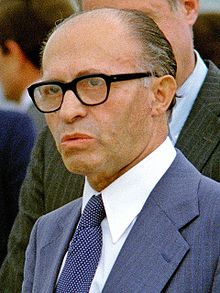
Back Menachem Begin Afrikaans Menachem Begin ALS مناحم بيجن Arabic مناحيم بيجن ARZ Menaxem Begin Azerbaijani Менахем Бегин Bashkir Менахем Бегін Byelorussian Мэнахем Бэгін BE-X-OLD Менахем Бегин Bulgarian মেনাখেম বেগিন Bengali/Bangla
Menachem Begin מנחם בגין | |
|---|---|
 | |
| 6th Prime Minister of Israel | |
| In office 21 June 1977 – 10 October 1983 | |
| President | Ephraim Katzir Yitzhak Navon Chaim Herzog |
| Preceded by | Yitzhak Rabin |
| Succeeded by | Yitzhak Shamir |
| Minister of Defense | |
| In office 28 May 1980 – 5 August 1981 | |
| Prime Minister | Himself |
| Preceded by | Ezer Weizman |
| Succeeded by | Ariel Sharon |
| In office 14 February 1983 – 23 February 1983 | |
| Prime Minister | Himself |
| Preceded by | Ariel Sharon |
| Succeeded by | Moshe Arens |
| Personal details | |
| Born | 16 August 1913 Brest, Russian Empire |
| Died | 9 March 1992 (aged 78) Tel Aviv, Israel |
| Political party | Herut (1948-1988) Likud (1988-1992) |
| Spouse(s) | Aliza Arnold (1939–82) |
| Children | Ze'ev Binyamin Hasia Leah |
| Alma mater | University of Warsaw |
| Signature |  |
Menachem Begin (16 August 1913 – 9 March 1992) was an Israeli politician. Originally a Zionist activist in Eastern Europe, he later became Prime Minister of Israel.

In 1941 he joined the Free Polish army. This is how he arrived in Mandatory Palestine in 1942.
In 1942, Begin joined the Irgun, a Zionist-Jewish paramilitary organisation, which was labelled as a terrorist organization in the 1940s.[1] From 1943 to 1948 he was commander of the Irgun.
He was the founder of the Israeli political party Likud. He was the sixth Prime Minister of Israel.
Begin’s most significant acts as Prime Minister include officially declaring Jerusalem the capital of Israel, imposing Israeli law on the Golan Heights, destroying Saddam Hussein's nuclear reactor in Iraq, controversially leading Israel through the early stages of the 1982 Lebanon War, and most famously, signing the Egypt–Israel Peace Treaty. For that treaty, Begin and Anwar Sadat shared the Nobel Peace Prize.
Begin resigned as Prime Minister in October 1983. He died on 9 March 1992 after a heart attack. He was buried on the Mount of Olives.[2]
- ↑ Irgun-Zvai-Leumi, Encyclopædia Britannica
- ↑ Sedan, Gil (10 March 1992). "Menachem Begin is Laid to Rest in Simple Mount of Olives Ceremony". Jewish Telegraphic Agency. Archived from the original on 18 May 2013. Retrieved 31 December 2014.